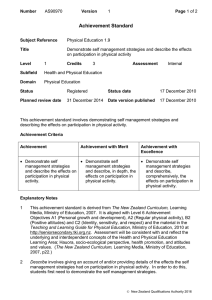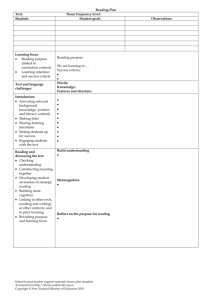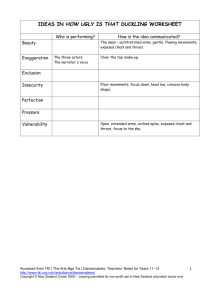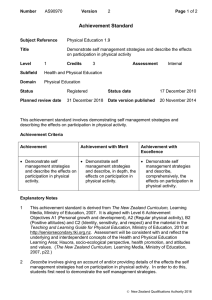Music in “The Arts in the New Zealand Curriculum” by
advertisement
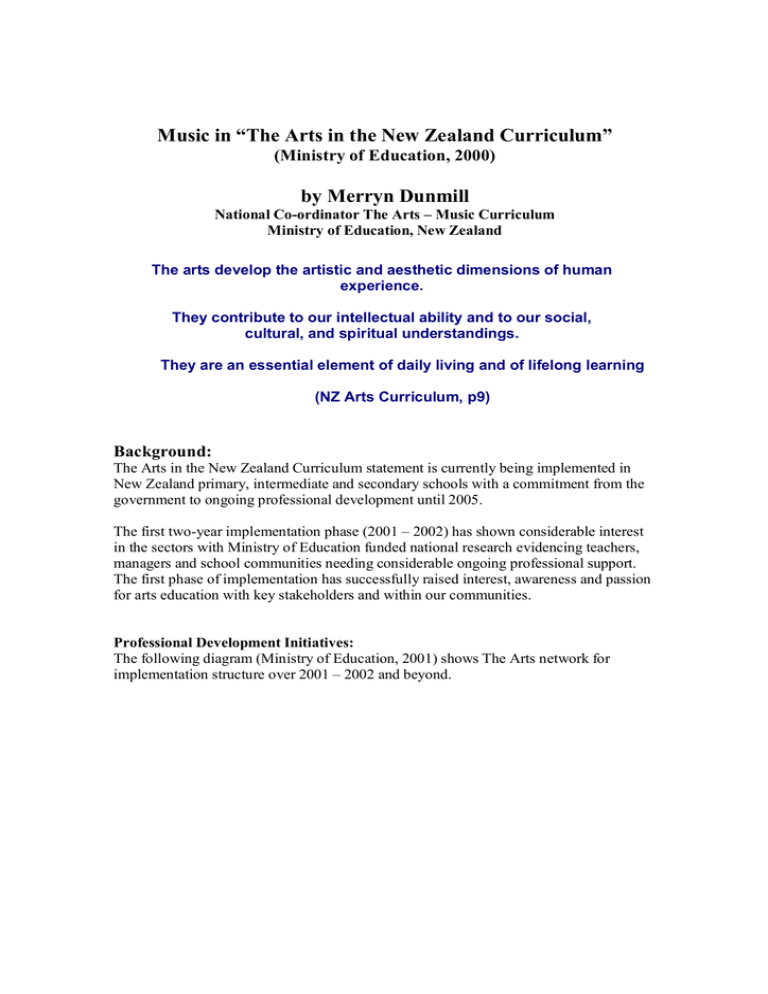
Music in “The Arts in the New Zealand Curriculum” (Ministry of Education, 2000) by Merryn Dunmill National Co-ordinator The Arts – Music Curriculum Ministry of Education, New Zealand The arts develop the artistic and aesthetic dimensions of human experience. They contribute to our intellectual ability and to our social, cultural, and spiritual understandings. They are an essential element of daily living and of lifelong learning (NZ Arts Curriculum, p9) Background: The Arts in the New Zealand Curriculum statement is currently being implemented in New Zealand primary, intermediate and secondary schools with a commitment from the government to ongoing professional development until 2005. The first two-year implementation phase (2001 – 2002) has shown considerable interest in the sectors with Ministry of Education funded national research evidencing teachers, managers and school communities needing considerable ongoing professional support. The first phase of implementation has successfully raised interest, awareness and passion for arts education with key stakeholders and within our communities. Professional Development Initiatives: The following diagram (Ministry of Education, 2001) shows The Arts network for implementation structure over 2001 – 2002 and beyond. THE BIG PICTURE National Co-ordinator for Dance National Co-ordinator for Drama Curriculum Facilitator National Co-ordinator for Music National Co-ordinator for The Visual Arts Regional contracts are with School Support Services (SSS) at: Auckland College of Education, Waikato University School of Education, Massey University School of Education, Wellington College of Education, Christchurch College of Education, and Dunedin College of Education. National contracts are currently with: Artsonline, and Pacific Teachers both via private consultants. Through the implementation contracts school communities are seeing a stronger focus on the arts. Best practice is hopefully being highlighted and generalist teachers are gaining access to quality professional development to enhance their teaching of Music, ultimately creating a more musically literate public. Professional Development approaches vary between regions based on local needs and human resources that are available for supporting teachers in the field. There have been two models of support involved in the current professional development programmes: • • a curriculum leadership model a whole school model Secondary school professional development in implementing The Arts Curriculum has been slower to develop as teachers in this sector grapple with the new qualifications framework - the “National Certificate of Educational Achievement”, for years 11 - 13. All the aforementioned contracts finish at the end of 2002. A new implementation phase begins for 2003 and beyond based on an Arts Strategy approach. This will see the consolidation of an advisory service with discipline-specific experts employed in each region to provide ongoing support for teachers. The model will be more intensive and needs-based involving teachers in on-site professional development to suit their particular situation. Online resource and professional support, and assessment support via National Exemplars, will be further developed over the 2003-5 period. There are four National Co-ordinators to support the implementation phases, one for each of the disciplines of the Arts Curriculum – Tina Hong for Dance (from Auckland College of Education), Peter O’Connor for Drama (from Applied Theatre Consultants, Auckland), Ann Brodie for The Visual Arts (from Wellington College of Education), and Merryn Dunmill for Music (from Christchurch College of Education). There is also a national Arts Facilitator, Camilla Highfield, who oversees all aspects from the Ministry of Education head office. The National Co-ordinator for Nga Toi curriculum, Rawiri Hindle (from Wellington College of Education and not shown in the diagram) works closely with the four National Co-ordinators for each arts curriculum discipline. The Nga Toi curriculum statement is by Maori, in Te Reo, for Maori immersion schools. It is not a translation of The Arts Curriculum statement. Toi Maori contexts and kaupapa are expected to be woven through arts teaching in mainstream classes. Many hui have been provided for discipline leaders, facilitators and teachers, that consider toi maori perspectives to support this important aspect. 2003/4 will see the production of discipline specific toi maori resources in each discipline. Community awareness has been raised through meetings that have been held throughout New Zealand by the fiveArts and Nga Toi Curriculum National Co-ordinators. This “roadshow” was designed to inform the public, and artists in the community, where progress is at and to gain support from the wider community. National networks and databases have been established which is a very positive step forward. Ongoing discussions and research are taking place with preservice tertiary providers to ensure communications are strong and arts advocacy is high in this important sector. Other initiatives established by the current government include support for secondary schools in the form of contestable funding for School Arts Co-ordinator positions in individual schools, and on regional and national bases. These contracts have been allocated during 2001 and 2002 and will continue over years to come. The New Zealand Society for Music Education (the NZ arm of the International Society for Music Education, ISME) has twice won a national contract for co-ordination of all music events relating to secondary school education. The networking and support for secondary teachers has been enormously well received. NZSME continue to support music curriculum initiatives throughout New Zealand and internationally. Recent Music Curriculum Materials and Assessment developments in Aotearoa New Zealand Presented at the UNESCO Pacific Region Arts Experts Congress, Nadi, Fiji, November 2002 by Merryn Dunmill National Co-ordinator of Music Ministry of Education New Zealand The following information was presented at the UNESCO Pacific Region Arts congress, held in Nadi Fiji, November 25 – 29, 2002. The presentation shared developments in Music discipline resources, website materials, and focused on the National Exemplar project introduced by Ann Brodie of New Zealand in her paper on Visual Arts Education in New Zealand. The presentation by Merryn Dunmill also included video footage of and discussion around two of the national exemplars for music. • Te Kete Ipurangi (www.tki.org.nz), the Ministry of Education website currently holds 25 Music learning examples (units of work) covering levels 1 – 5 of the curriculum, with 3 more to be added early in 2003. They are located on The Arts Unwrapped site of TKI. These learning examples are closely based on the curriculum statement with clear planning, teaching and assessing guidelines. Considerable guidance is given with hotlinks to Teaching and Learning Materials. Many are to be supported with video and audio clips. It is planned that a Music Education for Special Needs publication will be produced in 2003 to be uploaded on the TKI site and supported by video and still images. This resource will be suited to mainstream teaching situations. • At least 10 national music exemplars are to be uploaded onto the TKI site and will hotlink to The Arts Unwrapped learning examples. Exemplars will also be in paper versions (5 only) and 10 will be on CDROM/VHS for classroom use. These exemplars are national examples of student work/students at work that are annotated to illustrate learning, achievement and quality in relation to progressions in music learning as described in the curriculum achievement objectives and in the learning matrix developed by the National Co-ordinator of Music to support teaching planning and assessment through levels 1 – 5 of the music curriculum. Links are shown to Te Whariki (the Early Childhood curriculum) and to the National Certificate of Educational Achievement (the senior secondary qualifications framework). They will be in every school in Aotearoa New Zealand in 2003. • Artsonline is one of the national arts implementation contracts and this can also be found on TKI. This site offers teachers online professional development in each discipline with case studies, planning and teaching materials, forum discussions, research and resource updates and much more. This site also supports rural schools that cannot easily access the arts team facilitators nor their workshops. It is accessible to everyone however with some private comsuite functions for registered Artsonline PD schools. • The Ministry of Education, through its publisher Learning Media, has produced 3 guidelines for teaching music. These reflect the new curriculum and are presented in a user-friendly style including audio CD. Into Music 1 (years 1 – 3), Into Music 2 (years 4- 6), and Into Music 3 (years 7 – 10), are now in schools while Into Music 4 (Planning and Assessing in Music – levels 1 – 5) is due to be produced in 2003 with an accompanying video of case studies at each level. Learning Media has many other publications that support the music curriculum such as the Kiwi Kidsongs series, Cook Island Songs, and Samoan Songs. Many School Journals contain music-related stories and ideas. Other important groups are also developing music materials. In 2002 the New Zealand Music Industry Commission, with the financial and advisory support of the Ministry of Education, produced the first in a series of publications on contemporary New Zealand Music called “Sweet! A Taste of New Zealand Music”. This first resource package, sent free to all intermediate and secondary schools, contains an audio CD, CD Rom and a teaching resource book of contemporary New Zealand music and is targeted for levels 4 – 5 of the Music Curriculum. The NZ Music Industry Commission/Ministry of Education’s other projects include a Video and accompanying teacher booklet based around units of work featuring a wide range of NZ musical genres and styles, and in a range of historical and cultural contexts. This is to be published in 2003 and contains at least 7 large units of work based on selected genres eg Toi Maori, Composed Music, Hip Hop, Film Music. The Commission’s Music Mentoring Scheme, where rock musicians mentor young school students form years 7 – 13, has been a huge success and in 2003 broadens its regional bases to include not only Auckland/Northland but also Southland and the Bay of Plenty. Another initiative the MIC and MOE are funding is the Cokesmokefreerockquest Bands in Schools project where winning bands tour schools throughout New Zealand, sharing their talents and experiences with their peers. SOUNZ, the Centre for New Zealand Music (www.sounz.org.nz), has produced a resource for teachers based on the new curriculum that encompasses a wide range of New Zealand contemporary music of many genres and is particularly suited to upper primary and secondary students at curriculum levels 3 - 4. This resource kit, "Ears Wide Open, Taringa Areare”, includes a CD, and teacher and student workbooks. Future Directions: There is still considerable work to do in developing and maintaining networks, advising tertiary and keystakeholders in government and community agencies, and constantly advocating for music and the arts at regional, national and international forums. In terms of direct support for teachers, there are plans for more materials to be developed over the next two years, in toi maori, pasifika, and special needs contexts, and for more Artsonline case studies featuring: 1 music mentoring in schools – professional orchestral players, the MIC rock music/songwriting mentors, Itinerant teachers of music and Out of Hours vocal and instrumental tutors; 2 preparations for national music events such as National Youth Orchestra, Rockquest, Pasifika Beats, Choral Federation “Big Sing”, Chamber Music Competition, Kapahaka Festival, regional arts festivals and music festivals. In Aotearoa New Zealand we are currently experiencing an exciting and creatively rich period of national co-ordinated implementation. We seek to share with and learn from our colleagues in other nations so that we may all benefit from the much needed international collaboration in arts education. The future of the world may well depend on us! Tena te ngaru whati Tena te ngaru puku There is a wave that breaks There is a wave that swells. Merryn Dunmill (M.Ed Dist., B.Mus. Hons., L.T.C.L., Dip Tchg. Dist.) National Co-ordinator for Music, Ministry of Education Email: merryn.dunmill@cce.ac.nz or collective national arts curriculum team: moearts@tki.org.nz
